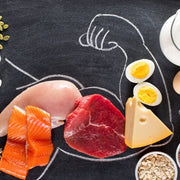

Is protein wasted if we eat too much at one time?
Have you ever been told that you can only absorb a certain amount of protein in one meal and the rest is wasted?
Let’s answer this!
1. Fast Acting vs. Slow Acting protein
Some proteins are more quickly digested and absorbed than others. Protein powders, such as whey, rice and pea are more quickly absorbed than casein, or other whole protein forms, like meats, eggs or dairy. The absorption rate of whey is estimated at 10g per hour. So, a 20g dose of whey would take 2 hours to be absorbed fully. Egg has the absorption rate of 1.5-3g per hour, and meat sits
around there as well, depending on the individual and other food that is ingested at the same time, such as fat or fibre.
Consider, also, hydrolyzed protein products. For example, branched-chain amino acid powder, which offers you individual amino acids which can be absorbed straight across the intestinal barrier. These types of supplements can help amino acid levels peak after just 30 minutes.
2. What happens to ingested protein?
When you eat protein, whether it is in a protein shake, tin of tuna or from vegetables or nuts, the enzymes and HCl in your stomach and small intestine have to break it down from long protein chains to individual amino acids. At this point, your body can absorb the amino acids across the small intestinal lining – the brush border. This takes them through the cells and into the blood stream where they can be added to the body’s amino acid pool and distributed accordingly.
Some amino acids are used mostly for structural functions in the body, while others are used for biochemical functions or even energy production.
3. What is the best amount of protein to eat?
Recommendations for muscle growth and maintenance is 1.6-2.2g/kg body weight. This can also go higher, depending on physical demands, however, dividing this amount over the day into servings such as 0.4-0.6g/kg body weight over 4-6 meals would help to cover those requirements
comfortably. Amino acids are crucial for optimal health and performance, so getting enough should be a dietary focus. If you eat small amount of protein over the day, that is fine! Or, if you eat a big meal, or do intermittent fasting, where you cram more of your meals and calories into a small window of time, that is fine too! Your body absolutely will not waste protein, as it is so crucial for so many functions. So, more is always better, to avoid deficiencies, eating disorders, mental health problems, structural issues, muscle wastage, etc…
4. Best Protein Timing
After exercise, blood flow and sensitivity to amino acid uptake is enhanced. It is beneficial to have protein before and/or after working out, but mostly, we want to just ensure we are covering protein intake regularly over the day. If you are working out in a fasted state, it is best to get protein in as soon as you can, especially if you are doing strength training. However, up to 2 hours after training is said to be fine, according to studies, but the sooner, the better.
In Conclusion
As in all things in life, moderation and working within a safe range is the optimal approach for those at the beginning of their health journey or who train at a moderate level. The more experienced should engage with health professionals who can tailor dietary requirements and training programs to individual needs.
And if you need to purchase BCAAs, protein powder or glutamine supplements to help with your recovery, take a look at the range of products offered by Payless Supplements. We promise you won't be disappointed.
References:
https://www.ncbi.nlm.nih.gov/pmc/articles/PMC5828430/#:~:text=Whey%20is%20a%20%E2%80%9
Cfast%2Dacting,20%2Dg%20dose%20of%20whey.










